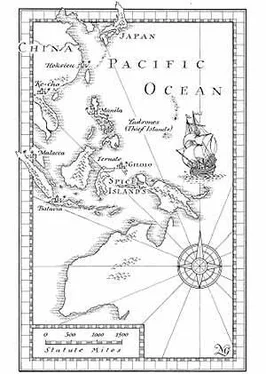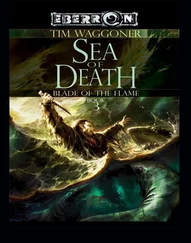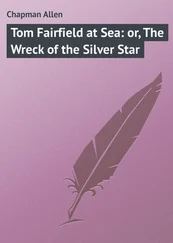Hector pointed a little to the north. There seemed to be a slight break in the wall of trees.
‘That looks like a place where we could try to come ashore.’
‘And what then?’ demanded Stolck bluntly. ‘This is a wasteland.’
‘At least it’s dry land,’ Jezreel reminded him. ‘Let’s get off the ship while the weather’s calm. The ship’s so rotten she’ll fall to pieces the moment there are waves of any size.’
They manhandled the skiff overboard, and Dan and Jezreel rowed off to investigate. They returned in less than half an hour to confirm they’d found that a small river emptied through a narrow creek and there was enough depth for the skiff to enter and unload.
All that morning they laboured, making several trips with the skiff. Dan selected a level spot on the river bank suitable for a campsite and they cut back the undergrowth, leaving small trees between which they ran ropes and draped sails as makeshift tents. They worked fast because thunderclouds were building up, towering over the interior and, as the first raindrops fell, they ran for shelter in the newly erected camp. Water drummed on the canvas, the rivulets carving runnels in the soft black soil. The unaccustomed smell of wet earth filled the air, and when the tropical downpour ended as quickly as it had begun, they heard the dripping and splashing from myriad leaves and branches as they shed the last of the deluge. While the others ferried the invalids ashore, Dan pushed his way through the wet thickets to investigate their surroundings. He came back to report that the river quickly dwindled into a stream and ran through rocky shallows, where he was sure they would be able to catch fresh-water prawns. He also brought back handfuls of small yellowish fruit the size of crab apples. They were full of seeds and had a sour, astringent taste, but Jacques thought he could use them in a stew that would help cure the sick.
‘Not a bad place to be cast away. Reminds me of my days cutting logwood on the Campeachy coast,’ observed Jezreel, slapping away an insect as he dug a small channel to drain away future downpours from the campsite.
Hector watched Maria carry a pitcher of water to the tent designated as a sick bay. She appeared to have regained her composure.
‘Tomorrow we’ll take off anything else from the ship that will be useful,’ he said to no one in particular. Now that they’d abandoned the Westflinge , there seemed to be a general acceptance that Captain Vlucht had no further authority.
‘How long do you think we will have to stay here?’ asked Stolck.
Hector looked out to the wreck on the coral shelf. The merchant ship lay slightly canted over on one side, her three masts still standing.
‘Not long,’ he answered encouragingly. ‘Anyone sailing along this coast will see the ship and come ashore to investigate.’
‘And what if no one passes this way?’
‘We’ll have to think about sending a scouting party inland or along the coast in the skiff. See if they can fetch back some help.’
As usual Stolck chose to be pessimistic. ‘And what about the invalids?’
‘If they’re not well enough to travel, you might have to volunteer to stay behind to look after them,’ Hector snapped. He was becoming irritated by the morose Hollander.
That night few of them slept well. The sensation of being on solid land was unsettling and strange. All around them in the darkness they could hear the sounds of the jungle – the snap of a branch breaking, the slower and more ponderous crash of a dead tree falling, unidentifiable noises as wild creatures moved through the undergrowth.

SHORTLY BEFORE DAWN, an ugly cacophony of cawing and squawking woke them. The sound was so strange that Dan left his tent to see what was causing the commotion.
‘Come and take a look. They’re the strangest birds I have ever seen,’ he said when he came back some minutes later. He led his friends along the river bank towards a clump of small trees. The noise got louder and louder as they approached, and they saw the branches were covered with a flock of jungle birds, several hundred strong. The birds fluttered, jostled and flitted incessantly from branch to branch, maintaining their raucous chatter.
‘Reminds me of magpies back at home,’ Hector whispered to Jezreel.
‘No need to lower your voice,’ said Dan. ‘They will ignore you. Probably have not seen humans before.’
One of the birds was still for a moment, and Hector blinked, thinking he’d seen double. The creature appeared to possess two pairs of wings. He looked again, and saw that he was mistaken. The forward set of wings was a remarkably long, pointed ruff of striking iridescent green, which the creature could extend at will. Then, as he watched, the bird suddenly raised four long, feathery white plumes from its back so that they stood straight up in the air, like a peacock spreading its tail.
‘What’s the creature so excited about?’ muttered Jezreel.
‘What do you think, mon ami?’ observed Jacques. The bird pranced up and down excitedly on the branch, fluttering his white plumes in a blur and calling out harshly. ‘He is trying to impress that little dark bird opposite him. This is cock and hen.’
Abruptly the male bird stopped his frantic fluttering, gripped the branch with bright-red claws and squatted down. Then he extended his glistening green ruff and held his position, quivering with desire. Jezreel guffawed. ‘There you are, Jacques. That’s just like your iron chicken, stuck halfway and vibrating.’

OVER THE next week Dan made several exploring trips. He cast in a wide circle around the camp and tramped for hours over the soggy leaf mould at the foot of huge trees eighty and ninety feet tall. But he found no trace of any humans. The others continued to take the skiff out to the wreck of the Westflinge daily. They stripped the ship of anything that might be remotely useful. Vlucht retrieved his charts, almanacs, hourglasses and navigation instruments. Jezreel and Stolck collected muskets, powder and shot, and Jacques, besides salvaging two copper kettles and a gridiron, brought back the hen-and-chicks timepiece, though he endured some mockery from Jezreel. Meanwhile the diet of wild fruit that the Frenchman prepared each day was proving effective. The five survivors from the Westflinge ’s original crew began to regain their health. Their stiff joints eased and their swollen gums shrank, although the invalids were left toothless. Soon they were sitting outside their tent in the sunshine and even taking some exercise.
‘She’s finally bulged,’ Captain Vlucht commented to Hector.
It was mid-morning on the tenth day since they had run aground, and the two men had strolled down to the mouth of the creek to look out at the wreck of the Westflinge . The ship lay heeled at a greater angle than before, and they could see a gaping hole in her side where the hull had split open. Her main topmast had collapsed, giving her an increasingly bedraggled appearance.
‘In another few days we can start building something bigger than the skiff. One of my men is a carpenter,’ Vlucht added. ‘He’ll be able to put together a launch big enough for the entire company. There’s plenty of timber out there.’ He nodded towards the Westflinge . ‘Then we can sail coastwise until we reach Tidore.’
Hector was about to say that it would have saved him a lot of worry if he’d known earlier about the carpenter. Instead his attention was caught by a new sound – a steady rhythmic chant, very faint. He listened again. He heard the lapping of water on the beach, the thin piping calls of a seabird standing on a tiny coral outcrop, and then on a waft of the breeze he heard the sound again. He recognized a chorus, a single phrase repeated over and over by many men, and behind it the regular thump of a drum maintaining the tempo.
Читать дальше









